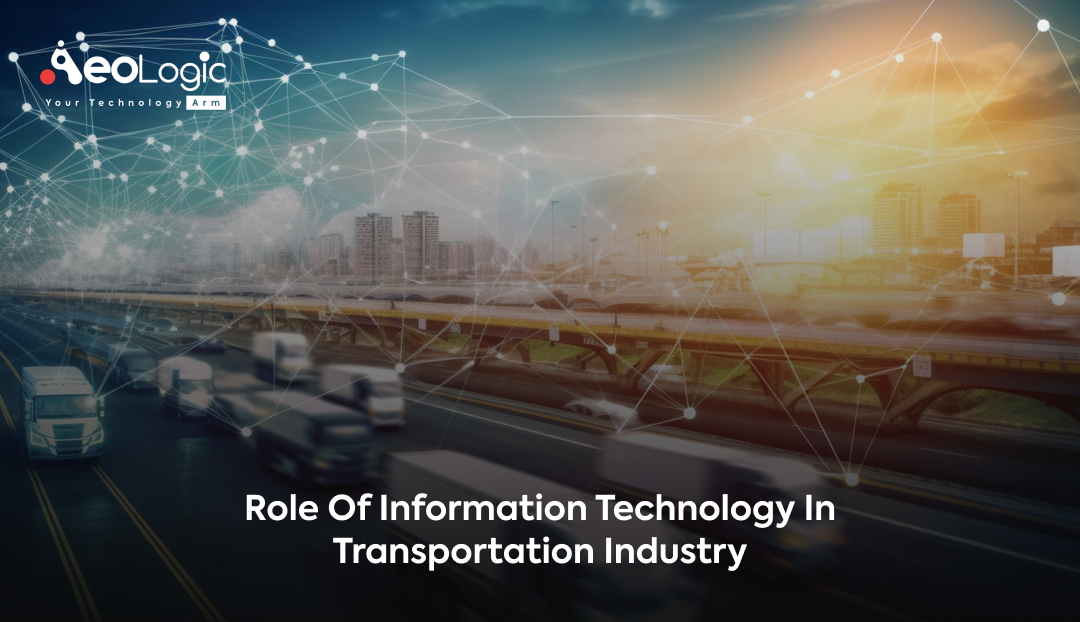Introduction
The role of information technology in transportation industry has reduced functional costs, and bettered client-seller communication and complaint addressing processes. Overall IT has helped to ameliorate effectiveness, make delivery systems more dependable, optimize the use of resources and bring safety to the transportation sector. The appearance of information technology and computer software in transportation has made record conservation a cakewalk. The advantages of transportation software are numerous- first, it reduces the consumption of paper, and second, it makes reclamation simpler and rapid.
Also read: How Information Technology Benefits Transportation and Logistics?
Role of Information Technology in Transportation Industry
The software helps to make plans that help to make the appropriate use of precious means. Information technology-driven software makes it easier to keep track of goods and avoid pilferage in bulk transportation. Logistics Software not only helps transport drivers to communicate with their clients but also helps internal communication within the association. Nearly all operations that bear the movement of documents and lines can now be replaced with software and cloud-model SaaS to work ever.
How Information Technology Helps Transport Drivers to Deliver Effective Services
The logistics assiduity is among the foremost business sector to use information technology. Widely speaking, Information Technology in the transportation sector refers to the use of telecommunication and computers considerably in multiple functions. For example, as storing information, reacquiring, and transferring data. Information technology has made a massive impact on the way the transportation assiduity is operating presently. Information technology has reduced functional costs, and bettered client-seller communication and complaint addressing processes. Overall IT has helped to ameliorate effectiveness, make delivery systems more dependable, optimize the use of resources and bring safety to the transportation sector.
Information Technology in Transportation Communication
Communication is an important tool that has no business proprietor can ignore. To stay and grow in business, transport contractors have to insure that their clients are kept happy at all times. Information technology has enables transport contractors and large truck line possessors to automate their client query needs. One of the biggest advantages of transportation software is that querying can be automated, save for rare occasions when human attention may be needed. By automating, transport contractors can make client confidence without spending money on human resources.
Aeologic Technologies not only helps transport drivers to communicate with their clients but also helps internal communication within the association. Nearly all operations that bear the movement of documents and lines can now be replaced with software and cloud- model SaaS to work ever. It’s currently possible to work 24/7 without exchanging to the plant.
IT for Integration and Flexibility
Information technology, makes it easy for businesses to be flexible in their approach to client’s requirements and objects. Software and operations now make it possible to accept small or large-scale service markets using IT processes. It makes the transportation company more competitive with knitter- made, cost-effective results. Information technology has come the main stay of numerous businesses making it possible to run home businesses.
Effective Use of Fleet
Transport drivers and truck possessors can now move more goods using their means efficiently. By using artificial intelligence in transportation software, it’s possible to assign a line, acquire a new or get on rental exchanges for seasonal demand for transportation. The advantage of transportation software designed to work with AI has made it possible to prognosticate conditions without going wrong.
Major Users of Information Technology in the Transport Sector
- Logistic companies furnishing transportation services to manufacturers.
- Large- scale online stores that have to deliver small orders.
- Road companies and truck drivers.
- Shipping agencies and ocean-going boat owners.
- Air Freight handling companies and Air Transport Fleet drivers.
- Overnight document delivery companies and correspondence service drivers.
- Reserving agents and freight instructors.
Intelligent Transportation Systems (ITS)
Traffic Management: Intelligent Transportation Systems (ITS) revolutionize traffic management via modern IT solutions. By using actual-time visitors monitoring, adaptive traffic indicators can modify their timings based totally on cutting-edge traffic conditions to limit congestion and decrease wait instances. Incident detection structures are critical as they speedy discover injuries or street blockages, allowing for quicker response instances and reduced site visitors disruptions. These technologies paint together to create a greater efficient and more secure riding environment, appreciably improving the flow and protection of day by day commutes and decreasing the environmental impact of street congestion.
Public Transit: ITS also plays a pivotal position in enhancing public transit systems. Smart ticketing solutions streamline the boarding manner, decreasing queues and making public transportation extra accessible. Real-time tracking of buses and trains guarantees that passengers have up to the moment facts on automobile locations, which complements reliability and person pride. Passenger information structures provide vital updates on schedules and any disruptions, improving the overall tour revel in and inspiring extra humans to apply public transit systems.
Vehicle-to-Infrastructure (V2I) Communication: V2I conversation is a transformative approach that permits automobiles to interact with road infrastructure which includes traffic lighting fixtures and signs and symptoms. This generation improves site visitors flow and drastically enhances avenue protection by supplying motors with actual-time facts about road situations and upcoming risks. By enabling a smoother go with the flow of site visitors and reducing the likelihood of accidents, V2I conversation helps the development of smarter, safer towns.
Fleet Management Systems
GPS Tracking: Fleet control has been transformed via GPS tracking generation, which lets in groups to screen their automobile places in real time. This visibility is vital for making sure that fleet operations run easily and effectively. It aids in short selection-making, helps in robbery recovery, and ensures the safety of each driver and cars. GPS tracking also allows greater customer service via supplying correct ETAs and actual-time updates.
Telematics: Telematics generation gathers and analyzes records on vehicle utilization, driving behaviors, and protection needs. This fact is invaluable for fleet operators because it allows in proactive preservation scheduling, enhancing car lifespan, and reducing downtime. Moreover, analysis of riding styles can lead to stepped forward motive force education packages, which beautify protection and reduce operational fees through better gasoline control and reduced wear-and-tear.
Route Optimization: Route optimization software uses superior algorithms to decide the most green routes for cars. This now not only saves time but additionally reduces gasoline intake and minimizes vehicle wear and tear. Efficient routing is especially beneficial in reducing carbon emissions, aligning with global efforts in the direction of sustainability. For companies, route optimization can result in extensive value savings and progressed purchaser delight through timely deliveries.
Logistics and Supply Chain Management
Warehouse Management Systems (WMS): WMS enhance the performance of warehouses by way of enhancing stock monitoring and dashing up order success techniques. These structures utilize real-time statistics to optimize the storage and retrieval of goods, reduce mistakes, and growth productiveness. By integrating with procurement and sales structures, WMS ensure that stock stages are maintained optimally, which minimizes storage fees and reduces the threat of stockouts or overstock conditions.
Transportation Management Systems (TMS): TMS are important for optimizing all aspects of the transport manner, including route planning, load scheduling, and provider selection. They help companies reduce charges and improve efficiency through finding the maximum comparatively cheap transport routes and techniques. Advanced TMS additionally beautify transparency in the deliver chain via imparting stakeholders with real-time insights into the transportation method, consequently enhancing communique and coordination amongst specific parties.
Mobile Apps: Mobile applications are important additives of present day passenger records systems. These apps provide customers with real-time updates on transit schedules, delays, and possible course changes, substantially enhancing the commuter experience. They additionally offer features like price tag booking, journey making plans, and mobile bills, making public transportation extra handy and consumer-pleasant. By empowering passengers with records and manage over their travel plans, those apps play a essential position in selling using public shipping and decreasing reliance on personal automobiles.
How Technology is Changing the Future of Transportation
Also, supply chains expand their global reach, transportation and logistics companies continuously seek new ways to increase flexibility, sustainability, and translucency. On the other hand, arising technology is critical to addressing those challenges and can lead to functional and financial benefits for leading supply chain businesses. From original product development to “ last afar ” delivery options, arising technologies are making supply chains more effective, productive, and cost-effective.
Some benefits of technological invention specific to the transportation and logistics assiduity include:
Improved Efficiency
Robotics, detectors, tracking software, and robotization are some of the advancements used by logistics and supply chain companies to produce “touchless” supply chain structure. Moreover, artificial intelligence (AI), machine learning (ML) algorithms, and advanced computer-grounded analytics and software help directors optimize processes and automate maintenance. Therefore, perfecting effectiveness across all parts.
Increased Visibility
Supply chain visibility improves with full product tracking from the manufacturer to the final delivery destination. Furthermore, cloud-grounded communication systems, high-speed internet, advanced software, detectors, and other logistics technology services make end- to- end visibility possible for all stakeholders.
Reduced Costs
Subsequently, technology that boosts productivity eventually reduces costs while perfecting services. Also, detector bias, tracking software, and barcoding technology reduce the need for manual intervention and accentuate the part of information technology throughout the supply chain. In addition, software using AI and ML can optimize delivery routes, lower shipping times. And help logistics managers make opinions that lead to effective cost-reduction strategies.
Also read: Importance of Technology in the Transport of the Future
Concluding Thoughts
In conclusion, the role of information technology has converted the transportation and logistics assiduity, making it more effective, safer, and sustainable. Real- time tracking, robotization, effective route planning, bettered safety, enhanced client experience, and bettered sustainability are just some of the benefits that technology has brought to the assiduity. Furthermore, as technology continues to advance. Thus, we can anticipate more transformation that will ameliorate the assiduity indeed more.










